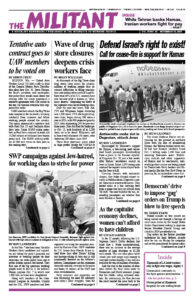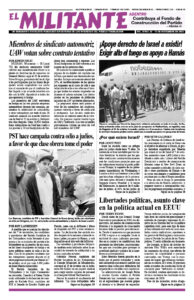HUDSON, Wis. — United Auto Workers Local 722 held a rally in front of the General Motors Parts Distribution plant here Oct. 30. Steve Frisque, the local’s president, told participants that picket lines would come down that evening after the union announced a tentative agreement with GM earlier in the day. He thanked everyone who supported the strike.
UAW members struck the Big Three auto companies for six weeks, winning solidarity from unionists and fellow working people around the country. The union announced a tentative deal with Ford Oct. 25 and Stellantis three days later. Some 16,600 union members at Ford have returned to work and 14,000 strikers at Stellantis have begun going back. The 18,000 striking workers at GM will return to their jobs in the coming days.
The UAW National Ford Council has approved the tentative deal. It will now be presented to union members who will vote whether to ratify or reject it. Prior to the vote union locals will hold discussions on the contract. A similar process will take place at GM and Stellantis. Altogether some 146,000 UAW members would be covered by the three provisional agreements.
The union has begun releasing some of the details of the Ford contract, which lasts four years. It includes a wage raise of 25%, the restoration of cost-of-living adjustments and a reduction from eight to three years in the time it takes for new hires to reach the top wage rate. Retirement tiers introduced in 2007 are not eliminated.
The Oct. 30 rally at the GM plant here included UAW workers and other unionists bringing solidarity. Teamsters Local 120 brought their union semitruck and provided lunch for everyone. Jennifer Grabczyk, financial secretary of Local 722, told the Militant that a food bank in Hudson delivered fresh vegetables to the picket line.
Striker Paul Copeland said the union had been resisting bosses’ harassment of its members at the plant. “We had five workers fired last year and the union was able, so far, to get three of them their jobs back,” he said. “We’re supposed to work eight-hour days but it almost always ends up being between nine and 10 hours a day.”
For COLA, against tiers
Frisque described to participants at an Oct. 21 Militant Labor Forum in Minneapolis the big concessions taken by the union after the 2008 recession. These included the tier system for wages and doing away with pensions and cost-of-living clauses. In 2007 the starting wage was $19 an hour. In 2020, it was $17. Meanwhile, inflation has gone up 19%, he said.
“Tiers bring divisions and that’s what they want,” he said.
Brett Carey, another member of Local 722, told the meeting that “some of my co-workers use food pantries as they can’t afford to feed their families with the wages we get.
“GM said it couldn’t afford our demands. Their first proposal was to give a 2% wage increase. Now they are up to 23%,” he said. “I’ve learned a lot on this job, how the company doesn’t care about its workers, only about the bottom line. That’s why the union is important.”
Also on the forum panel was Brandon Orr, a member of UAW Local 125 who works at the Mopar Parts Distribution Center in Plymouth, Minnesota.
“Being on strike has been a learning experience,” he said. Orr described grabbing half a dozen picket signs to take to participants at a union rally. When over 100 people showed up he was surprised. “I’ve learned the meaning of solidarity. This is an important fight we are waging, for us and for others.”
Mary Martin spoke at the Oct. 21 forum for the Socialist Workers Party.
Side by side with building solidarity with the UAW strike, it’s important for unions to oppose Jew-hatred, she said. The Oct. 7 slaughter of Jews in Israel poses a deadly threat to working people, she said. Martin described how the class-struggle leadership of the Teamsters in Minneapolis in the 1930s established a union defense guard. It mobilized to drive out of town fascist thugs who threatened the union and Jews. Israel has the right to exist as a refuge for Jews, she said.
In Canada 8,200 Unifor members at Stellantis plants in Ontario ended a brief strike Oct. 30 after the union reached a tentative deal with car bosses.

